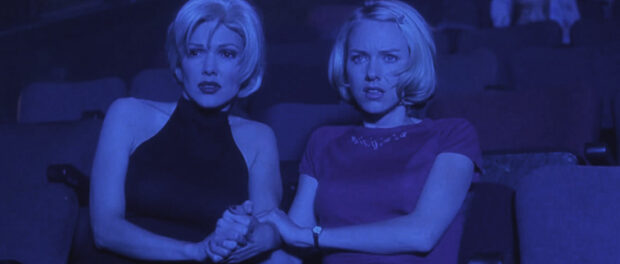Mulholland Dr. (2001)
[8]
Naomi Watts and Laura Harring star in this dreamy David Lynch film that almost defies summary, but I’ll do my best. Watts plays a young actress fresh in Hollywood who meets Harring, a woman who just escaped a car crash and has amnesia. Trying to figure out Harring’s identity, the two uncover an unsettling mystery and fall in love. Meanwhile, Justin Theroux plays a movie director who is being manipulated by shady characters to cast a certain woman as the star of his new movie.
While these plotlines certainly dovetail in intriguing ways, don’t expect Mulholland Dr. to explain itself or resolve in any tidy fashion. That’s not David Lynch’s way. What I liked most about the movie are not things other viewers may get out of the experience. To some extent, Lynch’s movies have become more and more like Rorschach tests. He paints a pretty picture and asks some interesting questions, but what you get out of the experience is largely dependent on what you bring to it.
For me, Mulholland Dr. speaks to the nature of art and storytelling, suggesting there’s a primordial source to it all, and that we are all, as Shakespeare said, just players strutting upon the stage while we are able. In one of the most haunting scenes from the film, a woman (Rebekah Del Rio) is on a stage singing — giving a heartbreakingly beautiful performance — and she dies before the song ends. But the song continues without her, still affecting the audience as her lifeless body is dragged behind the curtain.
As the film progresses, it blurs characters’ identities, with Watts and Harring playing multiple parts. On one level, the film seems to be saying that talent in Hollywood are just victims to be toyed with by the cold, unreasoning machinery of producers and production offices. But Mulholland Dr. goes further to suggest the conflict may be deeper — something eternal, maybe even religious. I found myself wondering if certain scenes weren’t suggesting death, rebirth, and ascension.
The beauty of David Lynch is that he can provoke this kind of experience. To be honest, halfway through this film I wasn’t appreciating it very much. It seemed to be a potpourri of Lynch’s greatest hits — pointed dialogue, ’50s kitsch, and walk-ons from absurd characters (Michael J. Anderson, the little man from Twin Peaks even appears). But at about the halfway mark, the film reaches a climax of sorts that makes you go back and reevaluate everything that’s happened up to that point. And while the film never comes together in a literal fashion, I dare say it does so in an emotional and maybe even a spiritual way.
The film runs long at nearly two hours and thirty minutes. There are scenes featuring characters and potential plotlines that never amount to much — possibly artifacts of the film’s beginnings as a rejected television pilot. Naomi Watts gives an incredible performance that shows tremendous range and fearlessness. There’s one shot of her where her reaction to someone goes from weight-lifting elation to abject terror that will stick in my memory forever. I was also happy that, even in his weirdest films, Lynch isn’t afraid to have a sense of humor — dark as it may be. The love scenes between Watts and Harring are also highlights — as viscerally bold as they are emotionally fragile.
With Ann Miller, Dan Hedaya, Robert Forster, James Karen, and… Billy Ray Cyrus?
Oscar Nomination: Best Director


